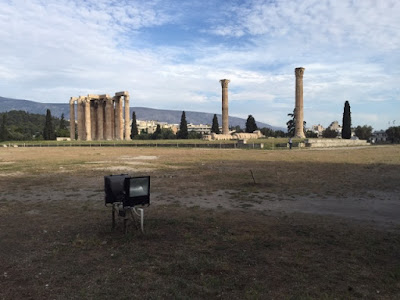The van picked us up right on time to take us to the airport. But I foolishly neglected to ask everyone if they had their travel documents until we had been underway for a few minutes. So we circled back, then tried again. We still arrived at the airport in plenty of time, and the flight was on schedule. We've been very lucky with flights all through the semester.
Athens is only about a one hour and forty minute flight. The airport is easy to navigate, and thanks to the 2004 Olympics, connections to the city are cheap and easy. We opted for the express bus. The Metro might have been a few minutes faster, but cost €2 per person more, and we weren't in a rush.
We were fortunate to have a nice hotel located very close to Syntagma Square (or in English, Constitution Square) -- the very heart of Athens. So it didn't take us long to get checked in. One exciting note, however -- an elderly Greek man came up to me as we waited for a stoplight and said, "Watch your bags! Gypsy women are following you." He may have been looking for a tip for himself. I didn't see any suspicious-looking women in the crowd. But I did remind the group of a famous
Rick Steves travel tip: In most European tourist destinations there are only two kinds of people -- tourists and pick-pockets. Since we'd just learned of increased pick-pocket activity in Malta, it was a good reminder.
We weren't surprised to see some political protesters in the Square. The Greek Parliament meets in the National Palace here, so protesters are par for the course. If we could have read the signs, we might have known what they were protesting, but it was all Greek to us. (As I discovered when we visited here four years ago, two years of New Testament Greek in college is very nearly useless in modern Greece -- partly because of changes in the language, but mostly due to four decades of forgetfulness.)
After everyone got settled, we met in the lobby for "Mark's official orientation walk." I had done some research to prepare. The Greek Ministry of Tourism takes a dim view of unlicensed tour guides, but I decided to risk it and was ready to plead that I am a professor teaching rather than a guide leading a tour. After all, Socrates used to walk though the
agora with his students following behind him. (But then again, look what Athens did to Socrates!)
 |
| Maddie poses with one of the guards |
We started by seeing the changing of the guard at the Greek tomb of the unknown soldier. It's a pretty unique exercise, especially in the traditional 1820s uniforms.
 |
| The honor guard approaches. There is one pleat in the skirt for each year of Ottoman occupation. |
We then walked down Ermou Street, the big, high-end pedestrian mall (think Nicolette Mall in Minneapolis), hoping to visit the 1,000-year-old Church of Kapnikarea that sits right in the middle of the street. Unfortunately, it was closed.
 |
| Kapnikarea |
So we continued on to Monastiraki Square. That place was so lively on a Saturday evening that I doubt the students heard a thing I said about the monastery that used to be here (with only the chapel remaining), or the mosque left here by the Turks. They did show some interest in the 2nd century A.D. ruins in the Metro station.
 |
| Some of what was found when excavating for the Monastiraki Metro station. |
We left the commotion of the square, working our way down the narrow Pandrossou Street. Fortunately, none got lost in the souvenir shops. At the Mitropolis (cathedral) we got inside another 1,000 year old church, the Eleftherios, so that I could explain the architecture and iconography. That helped the cathedral make better sense, perhaps.
 |
| Tiny Eleftherios Church was the cathedral of Athens during Ottoman rule, when Christians had to keep a low profile. |
 |
| Side view of Eleftherios showing carved stones. Sorry, no photos allowed inside. |
On Saturday evening, all the church supply, vestment, and icon shops of Filotheis Street were closed, but we saw what we needed to see in the shop windows. Then we continued on Adrianou (Hadrian) Street to the Lysicrates monument (in ancient Athens, they had trophies for the best play or poem, as well as for the best athletes), and on to the Arch of Hadrian and a peek through the fence at the Temple of Olympian Zeus.
 |
| Ruins of the Temple of Zeus |
By that time, the group was sick of me, and anxious to explore the shops and nightlife of the Plaka, the old center of Athens. So we turned them loose. Mary and I returned to the neighborhood around Syntagma, completing the triangle of our tour. Based on online recommendations Mary had researched, we found a little, family-run restaurant off the beaten track for some real Greek food and some cold liquid refreshment.
 |
| Meggie and Abby have just had a look at Hadrian's Gate |









No comments:
Post a Comment